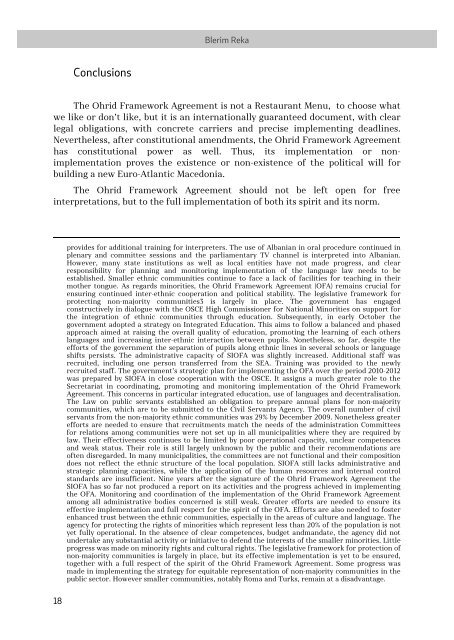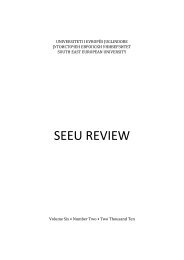Download - South East European University
Download - South East European University
Download - South East European University
Create successful ePaper yourself
Turn your PDF publications into a flip-book with our unique Google optimized e-Paper software.
Blerim Reka<br />
Conclusions<br />
The Ohrid Framework Agreement is not a Restaurant Menu, to choose what<br />
we like or don’t like, but it is an internationally guaranteed document, with clear<br />
legal obligations, with concrete carriers and precise implementing deadlines.<br />
Nevertheless, after constitutional amendments, the Ohrid Framework Agreement<br />
has constitutional power as well. Thus, its implementation or nonimplementation<br />
proves the existence or non-existence of the political will for<br />
building a new Euro-Atlantic Macedonia.<br />
The Ohrid Framework Agreement should not be left open for free<br />
interpretations, but to the full implementation of both its spirit and its norm.<br />
provides for additional training for interpreters. The use of Albanian in oral procedure continued in<br />
plenary and committee sessions and the parliamentary TV channel is interpreted into Albanian.<br />
However, many state institutions as well as local entities have not made progress, and clear<br />
responsibility for planning and monitoring implementation of the language law needs to be<br />
established. Smaller ethnic communities continue to face a lack of facilities for teaching in their<br />
mother tongue. As regards minorities, the Ohrid Framework Agreement (OFA) remains crucial for<br />
ensuring continued inter-ethnic cooperation and political stability. The legislative framework for<br />
protecting non-majority communities3 is largely in place. The government has engaged<br />
constructively in dialogue with the OSCE High Commissioner for National Minorities on support for<br />
the integration of ethnic communities through education. Subsequently, in early October the<br />
government adopted a strategy on Integrated Education. This aims to follow a balanced and phased<br />
approach aimed at raising the overall quality of education, promoting the learning of each others<br />
languages and increasing inter-ethnic interaction between pupils. Nonetheless, so far, despite the<br />
efforts of the government the separation of pupils along ethnic lines in several schools or language<br />
shifts persists. The administrative capacity of SIOFA was slightly increased. Additional staff was<br />
recruited, including one person transferred from the SEA. Training was provided to the newly<br />
recruited staff. The government’s strategic plan for implementing the OFA over the period 2010-2012<br />
was prepared by SIOFA in close cooperation with the OSCE. It assigns a much greater role to the<br />
Secretariat in coordinating, promoting and monitoring implementation of the Ohrid Framework<br />
Agreement. This concerns in particular integrated education, use of languages and decentralisation.<br />
The Law on public servants established an obligation to prepare annual plans for non-majority<br />
communities, which are to be submitted to the Civil Servants Agency. The overall number of civil<br />
servants from the non-majority ethnic communities was 29% by December 2009. Nonetheless greater<br />
efforts are needed to ensure that recruitments match the needs of the administration Committees<br />
for relations among communities were not set up in all municipalities where they are required by<br />
law. Their effectiveness continues to be limited by poor operational capacity, unclear competences<br />
and weak status. Their role is still largely unknown by the public and their recommendations are<br />
often disregarded. In many municipalities, the committees are not functional and their composition<br />
does not reflect the ethnic structure of the local population. SIOFA still lacks administrative and<br />
strategic planning capacities, while the application of the human resources and internal control<br />
standards are insufficient. Nine years after the signature of the Ohrid Framework Agreement the<br />
SIOFA has so far not produced a report on its activities and the progress achieved in implementing<br />
the OFA. Monitoring and coordination of the implementation of the Ohrid Framework Agreement<br />
among all administrative bodies concerned is still weak. Greater efforts are needed to ensure its<br />
effective implementation and full respect for the spirit of the OFA. Efforts are also needed to foster<br />
enhanced trust between the ethnic communities, especially in the areas of culture and language. The<br />
agency for protecting the rights of minorities which represent less than 20% of the population is not<br />
yet fully operational. In the absence of clear competences, budget andmandate, the agency did not<br />
undertake any substantial activity or initiative to defend the interests of the smaller minorities. Little<br />
progress was made on minority rights and cultural rights. The legislative framework for protection of<br />
non-majority communities is largely in place, but its effective implementation is yet to be ensured,<br />
together with a full respect of the spirit of the Ohrid Framework Agreement. Some progress was<br />
made in implementing the strategy for equitable representation of non-majority communities in the<br />
public sector. However smaller communities, notably Roma and Turks, remain at a disadvantage.<br />
18

















